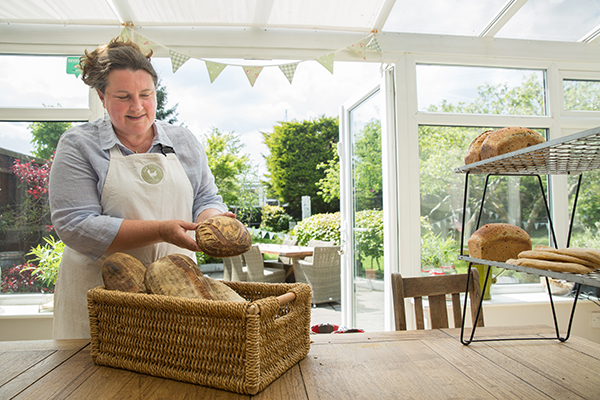It’s beyond anything we could’ve expected because people are genuinely interested in living more sustainably and creating food for themselves. Now we have a weekly micro-bakery that the local community can order bread and cakes from, and there’s a farmers’ market in our house on a Thursday where people can pick up the bread that they’ve ordered, eggs from the chickens, honey from the bees, chutneys that we’ve made.
How will you make change in 2020?
I’m going to be mentoring a new food business that has come out of the Grenfell disaster, with local women who are cooking for the community. We’ll be launching some new programmes that will push it even further. It has never been more important for people to engage with where their food comes from and to live more sustainably, so I’m determined.
The Restart Project
Here’s a party that can actually fix broken Britain. Encouraging us to dispose of our disposable culture, Restart Parties are a growing movement across the UK, which is also spreading into other countries. Hosted in cafes or community centres across the country, participants bring any old iron, hairdryer, TV, record player or lamp and experts keen to use their techy skills will fix it for you free of charge, doing a good deed and passing on the repair skills that were being lost. The parties were pioneered by The Restart Project, which sparked into life seven years ago, born out of frustration about the throwaway culture of the electronics industry. Co-founder Janet Gunter believed focusing on electronic items was a gap in our recycling thinking that needed to be plugged. She says: “We didn’t expect there to be so many people interested in sharing their skills. Repair tends to be a quite solitary activity and I think a lot of people were keen to get out, meet people and have a purpose.” The Restart Project also campaigns for technology to be repairable – in other words, phone manufacturers should have to make batteries removable so they can be replaced instead of having to upgrade the entire handset.
Trees for Cities
Trees for Cities have reached a momentous landmark. Since 1993 they have been making urban areas across Britain a little greener by planting trees, and they have just planted their millionth sapling. Trees bring with them numerous benefits: they can cut heating and cooling requirements of nearby buildings, enrich biodiversity, reduce the risk of flooding and, of course, improve air quality. In London, for example, trees remove 2.4 million tonnes of air pollution each year. And they also bring communities together. More than 10,000 volunteers were involved in projects last year. Trees for Cities also create edible playgrounds in schools, transforming tarmac into teaching gardens where kids can learn about growing vegetables and healthy eating, encouraging the green fingers of the next generation to take root and grow.
Catherine Conway
Plastic is not so fantastic, considering eight million tonnes end up in oceans each year. In the UK, 210g of plastic waste is produced per person per day, and from a total of 350 million tonnes of plastic produced, only 20 per cent is reused. Catherine Conway knew this had to change and founded her refillable shop, Unpackaged, in 2007. Hundreds of items can be filled from dispensers, everything from pasta, rice and grains to detergent, beer, wine and frozen food. Now a packaging guru, major retailers have been in contact to ask for help with cutting their plastic waste. “Our inbox would attest to the fact that they are all now getting their arses in gear,” Conway says. The future, she says, is for packaging to be returned to the retailer for them to recycle and use again. It would cost more, but the public is currently spending £700m per year through council tax to pay for recycling infrastructure. This money, Conway believes, would be better spent fixing the system.
UK Student Climate Network
Thankfully somebody took the climate crisis seriously – and not just one or two people like figurehead of the movement Greta Thunberg. A whole generation is acting to save all of our futures. Across the country, the UK Student Climate Network organised over 850 demonstrations throughout 2019, including the September Global Climate Strike that saw more than 300,000 take to the streets. They’re turning up the heat in 2020, pressurising the government to keep environmental issues a priority.
Kabir Kaul
As well as group action, there are outstanding young people managing to balance saving the planet with their homework. Nobody knows London’s wild side better than 14-year-old Kabir Kaul. Living in the city but obsessed with nature, Kaul decided to plot over 1,000 nature reserves and green spaces in the capital on an interactive map. “There’s so much more to London than Hyde Park,” he says. “It seemed adults were only recording the work of their own organisations, and not looking at all the wild spaces of London as a whole.” His work has put him at the forefront of the campaign to make London a National Park City.
Holly Gillibrand
While Kaul focuses on the city, campaigning to save Scotland’s biodiversity is 14-year-old Holly Gillibrand, who stands up for the native species threatened by continued climate change. The solution, she says, is about getting back to nature, and giving it back too. As a Rewilding Ambassador for Scotland: The Big Picture, the ambition is to create a vast network of natural areas where wildlife can establish itself again. In Scotland, 68 per cent of land is managed for agriculture, much of the 19 per cent of wooded land is commercial plantation and 48 per cent of species have seen their populations decrease over the last decade. That must change.
Finlay Pringle
In his hometown of Ullapool, 12-year-old Finlay Pringle spent every Friday in 2019 taking part in #schoolstrike4climate. Via the Twinkl app, his tips to save the planet have been turned into teacher resources, helping pupils understand what they can do to make an impact. Because he lives close to the sea, marine life is close to his heart. Known as the Ullapool Shark Ambassador, he aims to get all shark-based products banned.
Dara McAnulty
Dara McAnulty from Northern Ireland is a 15-year-old activist, whose first book, Diary of a Young Naturalist, will be published in June. Diagnosed with Asperger’s/autism aged five, nature became a life-support system, connecting him to the world around him and providing a way to channel his energy into something positive; campaigning on climate issues and promoting wildlife. Collecting an RSPB Medal for services to nature conservation, he said: “This is just the beginning. I will never stop working for nature. Ever.”










